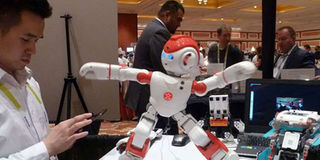Battle for digital life takes centre stage at tech show

Alpha 2, a humanoid robot from China's UBTech which can dance and respond to questions, is shown at the Showstoppers event at the Consumer Electronics Show in Las Vegas on January 7, 2016. PHOTO | AFP
What you need to know:
- At the Consumer Electronics Show which concluded Saturday, the contenders included robots, televisions, speaker hubs and even wearable trackers powered by artificial intelligence. And the connected car raced into the mix.
- South Korea's LG unveiled its Smart ThinQ home hub, a speaker that lets a user communicate with and get alerts from connected appliances, security systems and even talk to cars.
- Segway, which is owned by China's Ninebot, unveiled a personal transporter which morphs into a cute robotic personal assistant.
LAS VEGAS
The battle to be at the centre of your digital life has taken on a new dimension amid a proliferation of connected devices.
After smartphone wars, browser wars and platform wars, a fight is on to be the "hub" which connects the millions of connected objects from light bulbs to wearable to washing machines.
At the Consumer Electronics Show which concluded Saturday, the contenders included robots, televisions, speaker hubs and even wearable trackers powered by artificial intelligence. And the connected car raced into the mix.
Exhibitors ranging from startups to big consumer electronics giants are vying to be the control centre for the vast array of Internet of things in your home, car, and elsewhere.
South Korea's LG unveiled its Smart ThinQ home hub, a speaker that lets a user communicate with and get alerts from connected appliances, security systems and even talk to cars.
This allows the smart home and connected car to communicate with each other. And it can connect with older appliances with attachable sensors.
LG calls this "the future of the smart home" and uses an open platform that can connect with devices using Google Nest, Bluetooth, Wi-Fi and more.
Samsung announced its TVs will act as command centers in smart homes by incorporating technology from Silicon Valley start-up SmartThings, which Samsung bought in 2014, allowing them to control devices synched to the platform.
PERSONAL ROBOTS
"You can have a smart home basically for free as a starting point; it is pretty amazing," SmartThings founder and chief Alexander Hawkinson told AFP.
Chinese electronics giant Haier unveiled its Ubot personal assistant robot — a near-humanoid gadget which can control home appliances.
"He's like a personal assistant who can turn on your TV and all your appliances, and when you're not home he helps with surveillance," said Haier's Kristen Smith.
"The ultimate goal is to simplify your life, to take care of the things you worry about."

The Alcatel CareTime kid's smartwatch, which equip with its own SIM card for children to call for help with the five pre-set numbers their parents approve and a GPS tracker that allows parents to set safety boundary on Google Map and get alert if their kids exit that area, is on display at CES 2016 at the Las Vegas Convention Center on January 7, 2016 in Las Vegas, Nevada. PHOTO | AFP
Segway, which is owned by China's Ninebot, unveiled a personal transporter which morphs into a cute robotic personal assistant.
The robot, made in collaboration with Intel and China's Xiaomi, is open to developers which could add on applications for security, entertainment or other activities.
After riding it, the device sprouts arms and can navigate and interact with users with its sensors and artificial intelligence. It is expected to be commercialized later this year.
More whimsical, Chinese startup UBTech Robotics unveiled Alpha 2, a prototype personal assistant humanoid which can respond and entertain.
"You can talk to him and he will answer. He can give you the weather," said UBTech's Jessica Pan.
"And he is very lifelike. He has 20 joints and can move like humans, he can dance and show you a yoga pose."
These new contenders face a tough battle against entrenched companies like Google and Apple — not part of the floor exhibitors at CES — which each have their own artificial intelligence assistants as well as ecosystems for connected homes and wearables.
And Facebook's Mark Zuckerberg said ahead of the show that he wants to build a robot butler "like Jarvis in 'Iron Man'" which can manage household tasks.
While Zuckerberg and Facebook were not exhibiting at CES, his comments and the innovations at the show underscore the progress being made in computing and artificial intelligence which can unleash new innovations.





